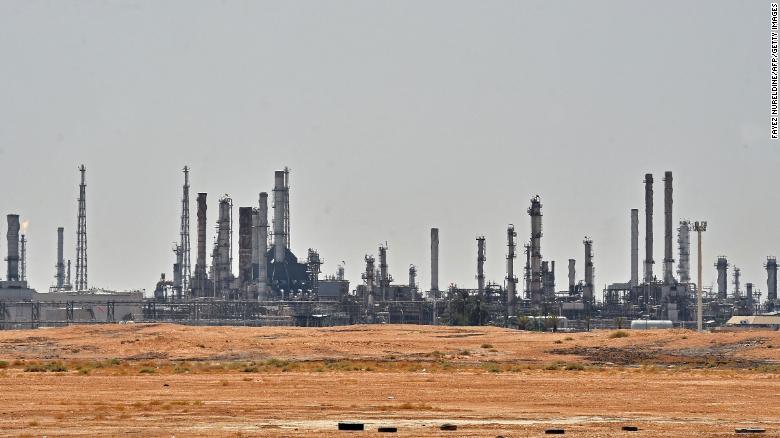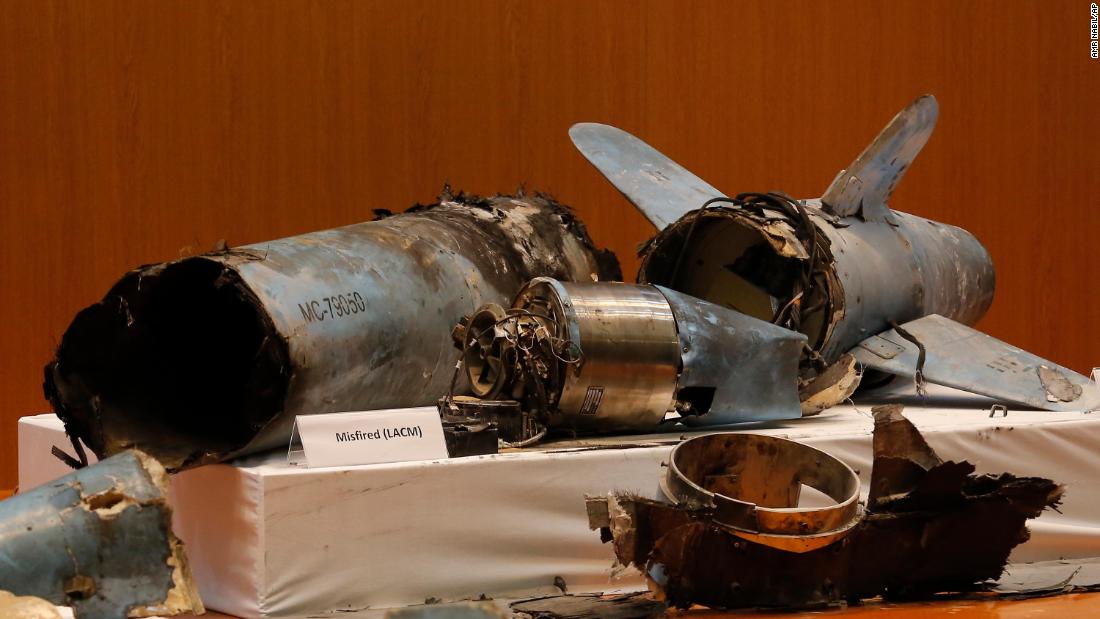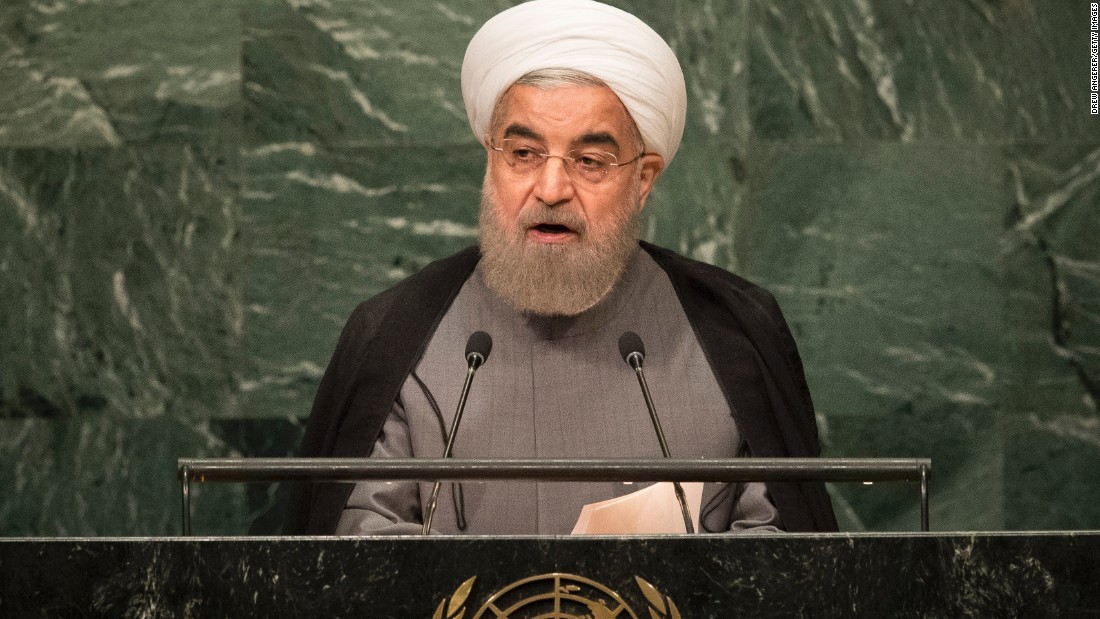Iran's Rouhani comes out swinging against the US

Tehran, Iran (CNN)Iranian President Hassan Rouhani has again denied responsibility for weekend attacks in Saudi Arabia and slammed US accusations against Tehranas "maximum slander."
"Instead of creating a positive atmosphere, the American diplomats are trying to exert maximum slander on Iran with baseless and meaningless accusations," said Rouhani, according to state broadcaster IRIB.
US President Donald Trump tweeted Wednesday that he has ordered new sanctions on Iran. He later said sanctions would be announced "over the next 48 hours."
It wasn't immediately clear whom the sanctions would apply to, but Trump has said the penalties that have crippled Tehran's economy since May 2018 would "substantially increase."
US Secretary of State Mike Pompeo will arrive in Jeddah, Saudi Arabia, on Wednesday for meetings with officials, including Crown Prince Mohammed bin Salman, to discuss a response to Saturday's attack.
US officials have held Iran responsible for the incident that initially roiled global energy markets, dismissing claims of responsibility by Yemen's Houthi rebels.
In an official note to the US sent through the Swiss embassy Monday, Iran said any military action against the country would draw an "immediate" response from Tehran, Iran's semi-official Tasnim news reported Wednesday.
UN appearance in doubt
Rouhani may also cancel his appearance at the United Nations General Assembly later this month. Tehran has said its delegation could call off a trip to New York if the US does not issue visas for his delegation "in the next few hours," Iran's state-run ISNA news reported Wednesday afternoon.
Iranian Foreign Minister Javad Zarif was due to fly to New York on Friday morning, and Rouhani on Monday.
"The Iranian delegation, which was due to travel to New York to prepare for Rouhani's visit to attend the UN General Assembly, has not been able to obtain visas until now," IRNA said.

The Saudi defense ministry on Wednesday displayed videos and photographs of what it said were Iranian weapons.
State media blamed the Trump administration for the delays.
On Sunday evening, Trump tweeted that the US was "locked and loaded" to respond to the attack. On Monday, Pentagon officials were ordered to plan potential responses to the attack, administration officials and sources familiar with their thinking tell CNN. But sources said the White House is waiting for the kingdom's rulers before charting a path forward.
Trump has yet to definitely state that Iran was behind the weekend attack, but others in his administration, including Pompeo, have pinned the blame on Tehran.
UN Secretary-General Antonio Guterres said the attacks were "a dramatic escalation in the Gulf" at a press conference Tuesday, adding that a delegation of UN experts had already left for Saudi Arabia to investigate the incident.
He also expressed the "need to create the conditions to avoid a major confrontation of the Gulf," which he said would have "devastating consequences for the region and globally."
Evidence of attacks
The Saudi Defense Ministry displayed videos and photographs of alleged Iranian weapons it said were used in the attacks during a news conference on Wednesday.
Saudi Defense Ministry spokesman Lt. Col. Turki al Malki said the attack itself did not come from the Yemeni side, but was carried out from the north to the south.
They are still working to determine the exact launch point, he added.
The attack knocked out almost half of Saudi Arabia's oil capacity and caused prices to skyrocket immediately after the incident. Saudi Arabia's Energy Minister Prince Abdulaziz bin Salman said the kingdom would aim to ramp up oil and gas production as fast as possible.
"We will try to bring the capability within the kingdom to 11 million barrels of oil per day by the end of September, and to 12 million by the end of November," the minister said in a news conference on Tuesday night.
Gas and oil production accounts for nearly half of Saudi Arabia's GDP. The Abqaiq facility, one of the main targets of Saturday's attack, is the world's largest oil-processing facility.
On Wednesday, Rouhani defended Yemen's right to respond to Saudi attacks on the country and said Saturday's attack should be considered a "warning" by Yemen's Houthi rebels.
The rebels threatened Saudi Arabia and the United Arab Emirates (UAE) with more attacks in a statement released by Houthi military spokesperson Yahya Saree on Wednesday.
"We will not hesitate to respond promptly and exceptionally to the countries of aggression, especially Saudi Arabia and the United Arab Emirates, if this aggression does not stop," Saree said.
He added that the rebels are able to produce more drones "in record time."
More than 91,000 people have been killed in Yemen's war since 2015, according to the Armed Conflict Location and Even Data Project. The war in the country has pitted a Saudi-led coaition against Iran-backed Houthi rebels. Saudi-led coalition airstrikes account for around 67% of all reported civilian fatalities, according to the same database.

Iranian President Hassan Rouhani addresses the United Nations General Assembly at UN headquarters, September 22, 2016 in New York City.
Blaming Iran
Saudi Arabia has so far stopped short of of blaming Iran for conducting the attacks, highlighting instead that the weapons were "Iranian-made" and offering evidence to show that the strikes were unlikely to have been launched in Yemen.
In a statement Wednesday, Saudi Arabia's Ministry of Foreign Affairs said the weapons used in the attack were "Iranian." Investigations were "ongoing to determine the source of the attack."
Crown Prince Mohammed bin Salman has not named Iran as the culprit but appeared to be calling for an international response to the incident.
According to Saudi Arabia's official news agency, bin Salman said the attacks were a "true test of the international will to face these sabotage attacks that threaten global stability and security." The remarks were made in a phone call with South Korean President Moon Jae-in, according to the Saudi Press Agency.
Saudi and US investigators have determined "with very high probability" that the weekend attack on the Saudi oil industry was launched from a base in Iran close to the border with Iraq, a source familiar with the investigations told CNN Tuesday.
Salma Abdelaziz reported from Tehran, Ghazi Balkiz reported from Beirut, while Hamdi Alkhshali and Mohammed Tawfeeq reported from Atlanta. Tamara Qiblawi wrote from Beirut.


Post a Comment